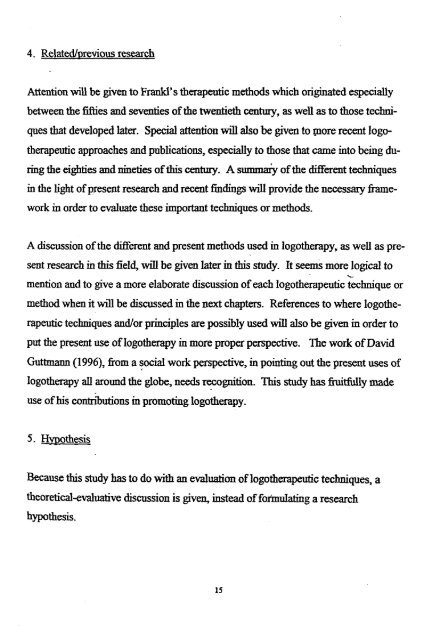View/Open - UZSpace Home
View/Open - UZSpace Home
View/Open - UZSpace Home
Create successful ePaper yourself
Turn your PDF publications into a flip-book with our unique Google optimized e-Paper software.
4. Related/previous research<br />
Attention will be givento Frankl's therapeutic methodswhich originatedespecially<br />
betweenthe fifties and seventies of the twentiethcentury, as well as to those techni<br />
ques that developed later. Special attention will also be givento morerecent logo<br />
therapeutic approaches and publications, especiallyto those that came into being du<br />
ringthe eighties and nineties ofthis century. A surnmaIy ofthe different techniques<br />
in the lightofpresent researchand recent findings will providethe necessary frame<br />
workin order to evaluatethese important techniques or methods.<br />
A discussion ofthe different and presentmethodsused in logotherapy, as well as pre<br />
sent researchin this field, will be given later in this study. It seems more logical to<br />
'mention<br />
and to give a more elaborate discussion ofeach logotherapeutic technique or<br />
methodwhenit will be discussedin the next chapters. References to where logothe<br />
rapeutictechniques and/or principles are possiblyused will also be given in order to<br />
put the presentuse oflogotherapy in more proper perspective. The work ofDavid<br />
Guttmann (1996), from a social work perspective,in pointingout the present uses of<br />
logotherapy all aroundthe globe, needs recognition. This study has fruitfully made<br />
use ofhis contributions in promotinglogotherapy.<br />
5. HyPOthesis<br />
Because this study has to do with an evaluationoflogotherapeutic techniques, a<br />
theoretical-evaluative discussion is given, instead offormulating a research<br />
hypothesis.<br />
15
















